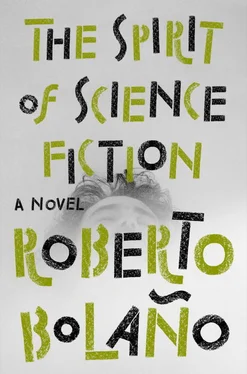I turned red.
“This is Jan, my friend and comrade.”
“Hello.” Smiles all around.
“Good evening,” said Jan, his voice not the least bit friendly.
“What a lovely young man,” said Estrellita. “And his darling balls are the color of gold.”
Jan laughed.
“It’s true,” I said.
“That means that he’s destined for greatness. Golden balls are the mark of a young man capable of… great deeds.”
“They’re not exactly golden,” said Jan.
“Shut up. She thinks they look golden, and so do I. That’s all that matters.”
“And I do, too,” said Angélica.
“What’s the mark of greatness for women, Estrellita?” asked Lola.
“Is there any wine?”
“Where are the glasses?”
“That’s more complicated, sweetheart.” Estrellita sat on the floor by the window, without taking off her coat. “A smile, a laugh. Though Eunice said it was in the gaze… but I believe it’s the laugh that’s the mark.”
“Wait a minute. Then nobody with brown skin, nobody from the Bronze Race would be destined for greatness, not to mention black people.”
“There are only five glasses and two chairs. We’ll have to share glasses.”
“What do you know about testicles? How many balls have you seen in your life?”
“Not a lot, true,” admitted Colina. “Maybe fifteen.”
“There are many marks of identity, Colinita,” said Estrellita. “For black people, it’s the wake they leave, memory and a sense of vertigo…”
“Estrellita is so talkative tonight.”
“It must be from the climb up five flights of stairs.”
“Sit on the floor.”
“She’s used to climbing stairs and staying up late.”
“So this is the only room in the place?” asked César.
“That’s right, it’s small.”
“What were you hiding under the mattress?”
“Nothing!”
“You and I will have to share this glass.”
Angélica sat down next to Jan, on the edge of the mattress.
“Yes,” said Jan.
“Is it true that you never go out?”
“Who told you that?”
“Your friend Remo and José Arco.”
“They lied to you. I go out every day. I love to walk along Insurgentes. Up and down, up and down, like a soldier in the Wehrmacht.”
“Like what?”
“A soldier in the Wehrmacht,” said Jan. “Did you notice the color of this building?”
“No, it’s dark out,” said Angélica. She smiled. She looked much more attractive here than at La Habana or her house.
“It’s greenish gray. Like the Nazi field uniform.”
“How do you know?”
“I’ve seen it in books. Pictures of the uniform. Exactly the same color as the front of this building.”
“That’s creepy,” said Angélica.
“You won a poetry prize, didn’t you?”
“Yes. Who told you that? Remo or José Arco?”
“Nobody. I read it somewhere.”
They looked at each other for an instant without smiling, like two piranhas swimming in a vacuum chamber. Then Jan said, “I’d like to read something you’ve written.”
Meanwhile I was looking at Laura, who was sitting at the other end of the room next to Lola Torrente, talking in a low voice. Every so often, our eyes met and we smiled, though not at first but centuries later, when we were eating the sandwiches that José Arco had gone out to buy at some place only he knew about, and even then we might not have been smiling because we liked each other, at least not openly, but because the energy radiated by Jan and Angélica, sitting still as statues or a blushing bride and bridegroom, was growing little by little in the tight confines of that room, and the rest of us—whether by photosynthesis or because that’s how we were back then or because in that place and on that night there was no other way to be, I swear I don’t know—began to smile at each other, more and more like brides and bridegrooms, eating and drinking deliberately and relentlessly, waiting for someone to plug in the dawn at the window under which Estrellita was sleeping.
Sunk in a cup of oil and lost was the arrival of the Torrente sisters’ parents, the breakup of the party half an hour later, my suggestion that we continue the fun—what was left of it—on the rooftop, the ride through nighttime Mexico City in taxis, rancheras on the radio, the precision of the Mexican dawn! and the faces, imagined or glimpsed through the windows of other cars, plunging into the tunnel with the determination of actors or commandos and coming out the other end ready for love, exquisitely made-up. The only thing that was real (I mean supremely real) was Laura’s smile from across the room, her meteorite smile, fading half smile, barely there smile, friend smile, smoke smile, knife-in-an-arsenal smile, pensive smile, and smile—finally—meeting mine without pretense: smiles sought, smiles seeking each other.
Still, the patient reader mustn’t imagine that this was some kind of mime show. God save me from a girl able to smile so many different ways in a matter of minutes. No. All the smiles fit into one smile. And the eye of the lover is like the eye of the fly, which means that other smiles might have been projected onto Laura’s lips, her teeth.
But even so, did it matter? After all, wasn’t Laura gradually turning into everyone and everything? Like the immaculate and ill-starred mother of legend, like the immaculate and ill-starred Aztec princess, like the immaculate and ill-starred wanderer of Tepeyac, like the immaculate and ill-starred Llorona, like the ghost of María Félix…
I leaped to my feet. I felt a little dizzy.
I announced that I was going down to the coffee shop two blocks away to buy sweet rolls. I asked for a volunteer to accompany me. Almost at the same instant, it occurred to me that José Arco might offer, and I was about to take back the request when Laura said, I’ll go, I won’t be long.
Who was she talking to when she said she wouldn’t be long? César?
As I was counting the money that people gave me, I couldn’t stop shaking and singing inside.
“This is a doll’s house. I wish I had a place like this,” she said as we went out.
The clouds, seen from the roof, seemed to suck up the electricity of the city; one even reached out a little arm that almost brushed the tallest buildings.
“It’s going to rain,” said Laura.
Her face, lit by the bulb hanging over the door to our room, seemed to turn transparent for an instant, silver for a fraction of a second, her brown eyes its only living, earthly feature.
“Do you know what name I’d give you?” I said as we were going down the stairs.
“Me?” she said, laughing as she passed Señor Ruvalcava’s door.
“That’s right.”
“Why would you want to give me another name? Don’t you like the one I have?” she asked in the lobby as I opened the door.
“I like your name a lot. It’s just something that occurred to me up there, all of a sudden. But never mind. I’m erasing it.”
“Now you have to tell me what it was.”
“No, it’s erased.”
“What’s the name?”
“Swear you won’t get mad.”
“That depends. Tell me what it is.”
“Listen, really, don’t ever get mad at me. I’d be a wreck.” I laughed stupidly, but I meant it.
“What’s the name? I can’t promise.”
“Aztec Princess.”
Laura burst out laughing. It really was dumb, and I laughed, too. God, what an ass I am, I said. You really are, said Laura. We turned off Insurgentes. Just as I expected, the coffee shop was still open.
(A few days later, I described this conversation to José Arco. Funny, he said, there’s a motorcycle called Aztec Princess. It’s a brown motorcycle, a Benelli, big, not too banged up, and the name is painted on the tank in silver letters. If you want, we can go and see it. Why? I asked. It’s a stolen bike, you could get it for cheap. No, I said, forget about it. I don’t know how to ride, I’m not interested. The guy who has it is a poet, said José Arco. His name is Mofles. You’d like him. But I hardly have enough money for food, I said. I don’t even have a driver’s license, and anyway I don’t like that shit. I hate those piece-of-crap bikes. Fine, fine, said José Arco.)
Читать дальше












